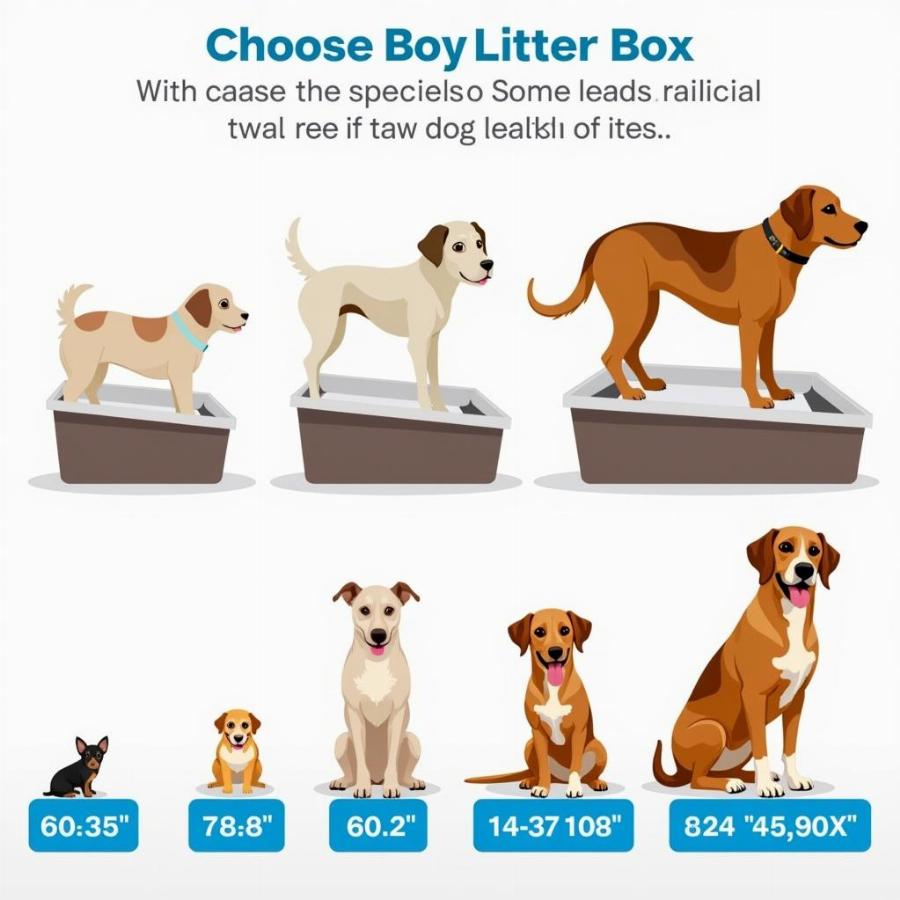Can you train a dog to use a litter box? It’s a question many dog owners, especially those living in apartments or with small living spaces, ponder. While dogs don’t instinctively use litter boxes like cats, training them to do so is possible with patience, consistency, and the right approach. Let’s delve into the world of dogs and litter boxes, covering everything from choosing the right one to successfully training your furry friend.
Factors to Consider Before Litter Box Training Your Dog
Before you embark on the litter box training journey, there are several factors to consider:
- Dog Breed and Size: Small dog breeds are generally easier to litter box train due to their bladder and bowel size. Larger breeds may find litter boxes too small for comfort.
- Age and Health: Puppies and senior dogs are often more prone to accidents, making them potentially good candidates for litter box training. Additionally, dogs with medical conditions that affect bladder control may benefit from litter box use.
- Lifestyle: If you live in an apartment, have limited outdoor access, or have a busy schedule, litter box training can offer a convenient alternative to traditional outdoor potty breaks.
Choosing the Right Litter Box for Your Dog
Selecting the right litter box is crucial for successful training. Here are key aspects to keep in mind:
- Size Matters: The litter box should be large enough for your dog to comfortably turn around and position themselves. For male dogs, consider a box with higher sides to prevent accidents.
- Location, Location, Location: Place the litter box in a quiet, easily accessible area away from your dog’s food and water bowls.
- Type of Litter: Opt for dog-specific litter, as cat litter can be harmful if ingested. Choose a litter that is absorbent, low-dust, and appealing to your dog’s sense of smell.
 Dog Litter Box Sizes
Dog Litter Box Sizes
A Step-by-Step Guide to Litter Box Training Your Dog
Just like any training endeavor, patience and consistency are key. Follow these steps for litter box training success:
- Introduce the Litter Box: Let your dog sniff and explore the litter box. Reward them with treats and praise for showing interest.
- Establish a Routine: Take your dog to the litter box first thing in the morning, after meals, and before bedtime.
- Positive Reinforcement: When your dog successfully uses the litter box, reward them immediately with positive reinforcement like treats, praise, or a quick play session.
- Handle Accidents Gracefully: Accidents happen. If your dog has an accident outside the litter box, clean it thoroughly without making a fuss. Do not punish your dog for accidents, as this can hinder the training process.
Benefits of Litter Box Training Your Dog
Litter box training, when successful, can offer numerous benefits for both you and your furry companion:
- Convenience: Litter box training offers a convenient alternative for busy owners and those with limited outdoor access.
- Hygiene: A well-maintained litter box can contribute to a cleaner home environment.
- Peace of Mind: For dogs with medical conditions, litter box training can provide a sense of security and reduce anxiety related to accidents.
Troubleshooting Common Litter Box Problems
Encountering setbacks during litter box training is normal. Here are some common issues and how to address them:
- Dog Not Using the Litter Box: Ensure the box is the right size, in a suitable location, and contains appealing litter. Reinforce training and consult your veterinarian to rule out any medical issues.
- Litter Box Aversion: If your dog seems afraid of the litter box, try a different type of box or litter. You can also make positive associations by placing treats or toys around the box.
Conclusion
While it might require some effort, training your dog to use a litter box can be a rewarding experience for both of you. Remember to choose the right litter box, remain patient and consistent with training, and always use positive reinforcement. With dedication and the right approach, you can successfully teach your dog to use a litter box, making life easier and more enjoyable for both of you.
FAQs About Dogs and Litter Boxes
Can any dog be litter box trained?
While smaller breeds are generally easier to train, dogs of any size can potentially learn to use a litter box with the right approach and dedication.
What do I do if my dog continues to have accidents?
Be patient and consistent with training. If accidents persist, consult your veterinarian to rule out any medical causes and seek guidance from a certified dog trainer.
Learn More About Dog Training and Care
For more helpful tips on dog training, nutrition, and overall well-being, explore other informative articles on Beaut Dogs.
Beaut Dogs is your trusted source for all things dog-related. We are dedicated to providing dog lovers like you with expert advice and resources to help you provide the best possible care for your canine companion. Have questions or need personalized support? Reach out to us at [email protected], and our team of experts will be happy to assist you.